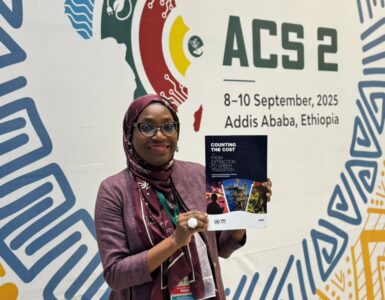This October, the coastal town of Saly, Senegal played host to two critical African climate justice convergences – the 2024 Women’s Climate Assembly (WCA) alongside the African People’s Counter COP (APCC). Both gatherings, happening in parallel, brought together a diverse group of activists, NGOs, leaders, and community women to address the urgent need for climate action in Africa. Under the banner, African Women Rise to Defend their Lands, Oceans and Forests, a hundred and twenty community women from across twelve countries in Central and West Africa met to discuss strategies of resistance against the intersecting crises affecting their communities and countries in the fight for climate justice, food sovereignty, the Right to Say NO to destructive big development and extractives projects displacing communities, calling for reparations and ending climate debt.
Led by a steering group of NGOs, community organisations and their allies including Lumière Synergie pour le Développement, Green Development Advocates, WoME Sierra Leone, Kebetkache Women and Development Resource Centre and WoMin African Alliance, the past two annual gatherings were held in Port Harcourt and Lagos, Nigeria. This third assembly from 7 – 11 October 2024 provided a crucial platform to foreground the voices of African women who are often invisibilised. Women took center stage in demanding action and justice for their communities.
The WCA focused on empowering and amplifying the voices of African women who are disproportionately affected by the impacts of climate change. Discussions and workshops centered around the role of women in climate action, the protection of indigenous lands and natural resources, and the importance of gender equality in addressing the climate crisis.
This Pan-African effort helped build a collective movement that addresses the needs of Africans who are most deeply impacted by rampant resource extraction and ecological degradation. With climate disasters happening more frequently on the continent it is African women particularly who are at the frontline of the climate crisis. The assembly focused on the role of African women as custodians in protecting and preserving the environment.
Through the week-long assembly of teach-ins, marches, field trips, Each One, Teach One sessions and more participants had the opportunity to learn from each other’s experiences, deepen their knowledge and build solidarity through their linked struggles. It was a radical space to support African women organisers, activists and communities in their local mobilisations and organising.
The assembly stressed the importance of women’s resistance and leadership in creating development alternatives to the capitalist economic model and the Global North’s rapacious thirst and global demand for Africa’s natural resources and mining for critical minerals like cobalt and lithium fuelling conflict in the Democratic Republic of the Congo, oil pollution in the Niger Delta to forest and land grabs for monoculture farming in Cameroon and water sources being polluted.
“As Africans, I want us to think about the world in which we are living. All the wealth is coming from Africa. Gold is coming from Africa. Phosphate is coming from Africa. Oil is coming from Africa. Cobalt is coming from Africa. When foreigners come to our countries they bribe away leaders, they bribe away chiefs, they bribe away governments. If we look at all the wealth in Europe, all the wealth that they are using in the factories and plants in Europe, everything is coming from Africa.” – Ndieme Ndong, Senegal
They also called for the recognition of the vital role of African women in climate justice and the need for gender-responsive policies and actions. Ahead of the upcoming COP29 in Azerbaijan from 11 to 22 November, Africa and African women’s voices must be heard for they are experiencing the brunt of the crisis in their daily lives.
“In my village in Côte d’Ivoire, if we want to get outside of our community, we need a gate pass to explain why we are going out. When we are in our own village, you cannot move your goods freely. There are guards, uniformed men, always in yellow, who monitor movements on behalf of the palm oil company. A lot of women have been arrested and put in prison by these wicked multinationals just because they are picking fruits of the palm for themselves. This is OUR land. We had to do something. We had to fight for the liberation of these women. So, as women, we organised.” – Josiane Boyo, Cote d’Ivoire
As the world grapples with the devastating effects of climate change, the voices of African women are more critical than ever. The 2024 Women’s Climate Assembly has shown that when women come together, they can be a powerful force for change. African women are determined to make sure their demands and powerful organising in the fight against the climate crisis are heard and seen. Alongside the African People’s Counter COP, this annual assembly has set a precedent for future collaborations and united efforts towards a more just and sustainable future for Africa and the world.
The WCA and APCC’s joint gathering marks a significant step towards building a more inclusive and effective approach to climate action in Africa. African women are determined to make their voices heard and drive real change in the fight against climate change. Together, they are forging a new pathway to a sustainable future for all.



























